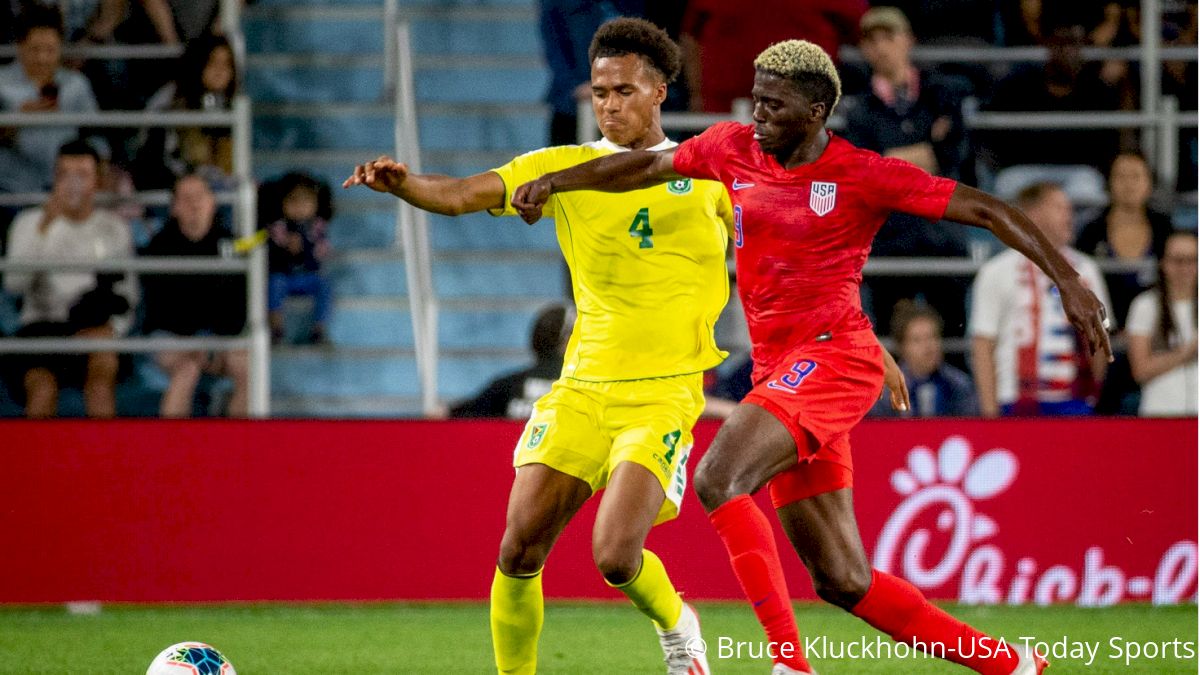Plenty To Learn About US Despite Easy Gold Cup Win Over Guyana
Plenty To Learn About US Despite Easy Gold Cup Win Over Guyana
Breaking down the U.S. men's soccer team's defeat of Guyana in the CONCACAF Gold Cup.

Just about what we expected.
The common reaction following the U.S. men’s national team’s Gold Cup opener against Guyana — somewhere in the middle of panic mode and overtly pleased — isn’t necessarily a bad thing for a team coming off losses to Jamaica and Venezuela. Allianz Field, Minnesota United’s glimmering new soccer cathedral, played host to multiple goals and a shutout, but it appears to be a heads-down approach for the team moving forward.
“We’re not going to go overboard, because it’s a game that we should win and that we did win,” captain Michael Bradley noted after the game.
While supporters will be content with the outcome and a few bright spots on the field, it wasn’t always a walk in the park, particularly for the first half hour of play. Gregg Berhalter’s first competitive win at the helm left us with a few nuggets to mull over ahead of Saturday’s game against Trinidad & Tobago in the two teams’ first meeting since the Soca Warriors kept the Stars and Stripes out of the World Cup 20 months ago.
Finding the right recipe up top
Although he has yet to start a match under Berhalter, Jozy Altidore remains the USA’s most complete and proven option at the striker position. With Altidore still returning to full fitness, Gyasi Zardes got the start up top and didn’t do much to convince fans that he deserved a spot in the roster ahead of Josh Sargent. Sure, the work rate was there, but poor first touches, suspect decisions, and missed chances had many scratching their heads.
Meanwhile, Tyler Boyd went out and offered a resounding statement that he should join Paul Arriola in the front three with his relentless and clever movement, link-up play, and nose for goal.
“Just a dream come true,” Boyd said after a two-goal performance. “It’s been years and years of work to get to this moment.”
❤️???
— U.S. Soccer MNT (@USMNT) June 19, 2019
Tyler Boyd got to share his first two goals -- including the 1,000th in #USMNT history -- with his family last night. #GoldCup2019 #TheFutureIsUS pic.twitter.com/J6GeFFdIYS
Berhalter was quite pleased with the 24-year-old’s first competitive appearance for the U.S, which came just one month after a FIFA-approved switch from New Zealand.
"It's what we've been talking about," the manager said. "The verticality, the finishing, the work rate, all those things are what we've been discussing, and I think it was a good start for him."
Tempo and press
The U.S. are better than the majority of nations in this tournament in virtually every aspect of the game. Did they play with the confidence of a superior team in the early stages? Not so much.
The first 30 minutes were largely characterized by stale U.S. possession and an inability to break Guyana’s midfield and defensive lines. The opposition looked largely comfortable in sitting back and limiting opportunities. However, once the Yanks began applying pressure, space began to immediately open and scoring chances followed. It appeared Arriola’s adept finish 28 minutes in and a collective realization that they could easily cause the opposing defense more trouble flipped a switch.
The type of quick passing and movement into space we’ve all been wanting to see under Berhalter came to fruition in the subsequent minutes. Let’s see more of that from the opening whistle.
Questions at the back
Berhalter once again elected to field a back four that shifts to a three-man line in attack. Veteran Tim Ream got the start on the left and tucked in, Walker Zimmerman and Aaron Long teamed up in the middle, with Nick Lima sliding in for the injured Tyler Boyd on the right and providing width going forward.
Guyana didn’t apply the quality pressing that the likes of Mexico, Costa Rica, and Panama will undoubtedly generate, but when they did pressure, the U.S. back line wasn’t entirely convincing. The center backs left Bradley exposed on a couple of occasions with errant passes, and Long also looked suspect on a couple crosses into the area.
Zach Steffen will have felt a bit of pressure coming off mishaps in the tune-up matches. He was a spectator for much of the night, but he was able to bail out Nick Lima with a solid save when the right back lost his man with 20 minutes to play. Steffen’s passing out of the back was clean enough to get the job done against Guyana, but we’ll know a lot more about his communication with the back line and distribution in the next week and a half.
Stiffer tests are on the horizon with group games against Trinidad & Tobago and Panama. Whether or not the Yanks are able to apply consistent, cohesive pressure from the outset and play with a higher tempo against teams they should outclass will go a long way in determining what sort of chemistry and momentum they can build heading into the knockout stage.
Related Content
 How to Watch: 2024 Smith College vs Springfield - Women's | Soccer
How to Watch: 2024 Smith College vs Springfield - Women's | SoccerMar 14, 2024
![How to Watch: 2024 Salve Regina vs Wellesley College[a] - Women's | Soccer](https://d2779tscntxxsw.cloudfront.net/5d1b91f16a42a.png?width=400&quality=80) How to Watch: 2024 Salve Regina vs Wellesley College[a] - Women's | Soccer
How to Watch: 2024 Salve Regina vs Wellesley College[a] - Women's | SoccerMar 14, 2024
 How to Watch: 2024 Mount Holyoke College vs W.P.I. - Women's | Soccer
How to Watch: 2024 Mount Holyoke College vs W.P.I. - Women's | SoccerMar 14, 2024
 How to Watch: 2024 Emerson College vs M.I.T. - Women's | Soccer
How to Watch: 2024 Emerson College vs M.I.T. - Women's | SoccerMar 14, 2024
![How to Watch: 2024 Wellesley College[a] vs M.I.T. - Women's | Soccer](https://d2779tscntxxsw.cloudfront.net/5d1b91f16a42a.png?width=400&quality=80) How to Watch: 2024 Wellesley College[a] vs M.I.T. - Women's | Soccer
How to Watch: 2024 Wellesley College[a] vs M.I.T. - Women's | SoccerMar 14, 2024
 How to Watch: 2024 Babson College vs Clark - Women's | Soccer
How to Watch: 2024 Babson College vs Clark - Women's | SoccerMar 14, 2024
 How to Watch: 2024 Springfield vs Babson College - Women's | Soccer
How to Watch: 2024 Springfield vs Babson College - Women's | SoccerMar 14, 2024
 How to Watch: 2024 W.P.I. vs Emerson College - Women's | Soccer
How to Watch: 2024 W.P.I. vs Emerson College - Women's | SoccerMar 14, 2024
 How to Watch: 2024 United States Coast Guard Academy vs Salve Regina - Women's | Soccer
How to Watch: 2024 United States Coast Guard Academy vs Salve Regina - Women's | SoccerMar 14, 2024